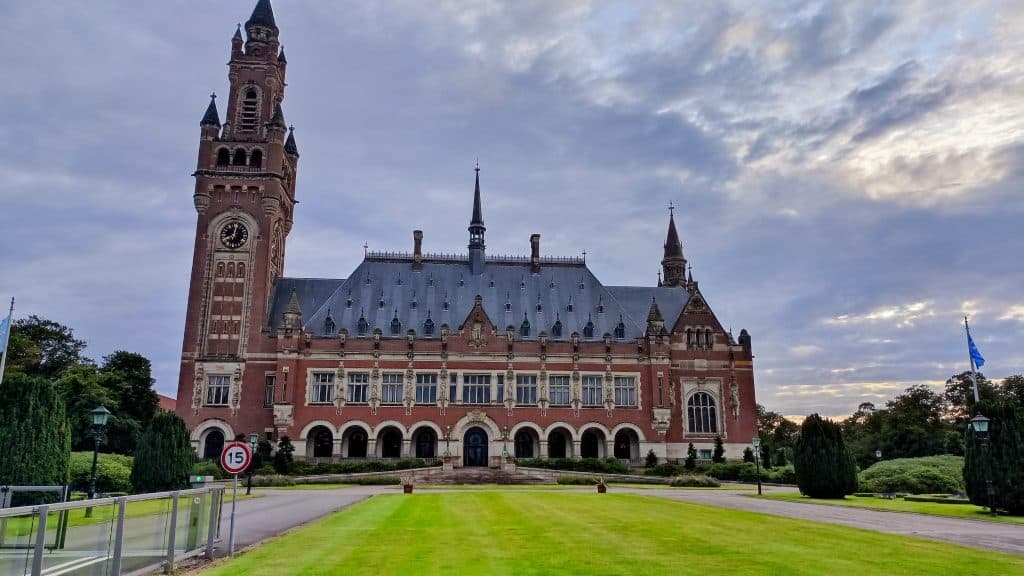
On the afternoon of Friday, July 19, the International Court of Justice (ICJ) announced an opinion regarding “Legal consequences arising from the policies and practices of Israel in the occupied Palestinian territory, including East Jerusalem.” Despite the drama that the event generated among the stakeholders, it was by no means a dramatic event. The anti-Israeli character of the decision was a foregone conclusion. Below, I shall briefly review the circumstances that led to the decision’s publication and, for the sake of explaining the reasons, focus a bit on its content.
First of all, as Jews we have learned from experience about the timing that international institutions generally choose for announcing a decision against us — a decision based on rejecting our historical, national, or religious rights. So the news that the decision was to be announced on a Friday afternoon, when most Israelis are not at work and the Sabbath is about to start, implied which way the wind was blowing. Such decisions are generally announced on a Friday or the eve of a Jewish holiday. It’s hard to cite exceptions.
Secondly, the phrasing of the question that was posed by the UN General Assembly to the ICJ, as reflected in the title of the decision, presupposes that Israel is guilty of violating international law. Note that the procedure supposedly allows the General Assembly to ask the ICJ a legal question provided that the question does not yet have a clear answer. Here, the General Assembly has decided the legal answer in advance and proceeds, in an attempt to justify turning to the ICJ, to pose a further question about the implications. In other words, guilt is decided before the court has even begun to examine any legal aspects and therefore it’s no surprise that the court’s answer is no more than a sort of rubber stamp branding Israel as guilty.
From the list of countries supporting the request for this opinion, another hint foreshadows the response. Only 80 countries supported the request, two thirds of them have no diplomatic relations with Israel, and most of them do not recognize its right to exist at all.
Added to that is the fact that no Palestinian infraction has ever been brought before the panel. The judges have never been asked to consider the Palestinian Authority’s policy of payments to terrorists and their families, the incitement to terrorism and anti-Semitism, the rule of Hamas in the Gaza Strip, or the terror attacks against Israel.
Another matter to be taken into account is the identity of the judges. For example, the President of the ICJ is none other than Nawaf Salam, a Lebanese diplomat and jurist. As may be expected from a Lebanese diplomat, Salam has a lengthy documented history of harsh anti-Israeli statements as well as votes against Israel in the UN. With such a judge presiding over an institution purported to rule objectively, and authoring the majority opinion, again we may guess at the spirit of the decision without reading a word of it. It bears noting that ICJ procedure requires a judge who is so clearly inclined against one of the parties to recuse himself, and following the ICJ’s receipt of the request Salam received many calls to do so — not only from sources who value Israel’s wellbeing, but also from sources who value the ICJ’s image and fear that such a disgrace, which does not lend itself to concealment, will damage the court’s reputation. Salem, of course, declined. He continued, unimpeded, to head the proceedings, which have turned into a weapon against Israel.
Indeed the international institutions have long been transformed into anti-Israeli weapons, and Israel stands at a significant strategic disadvantage in this arena. Israel’s enemies, on the other hand, have learned to exploit the same arena to the fullest.
Another fact demanding attention is the glee with which the decision was welcomed by the murderous terrorist organization Hamas. In light of that, what can the international community say in its defense? It is quite a painful fact that mere months after the atrocities of October 7, and with more than 100 Israeli hostages still being held in the Gaza Strip, the ICJ has awarded an unprecedented prize to Palestinian terrorism and sent an unambiguous message to terror supporters everywhere: Terrorism pays, on the chief condition that it targets Jews.
A word about the content. The decision is packed with misrepresented facts as well as with indifference to history and to all international rules and precedents. All means are acceptable for reaching the predetermined objective — the condemnation of Israel as a war criminal.
Space will not accommodate all the absurdities that are smeared over the many pages, but I will provide a few examples.
To begin with, according to the ICJ all Jewish settlement, without exception, is illegal. Every Jew putting down stakes in Jerusalem or in the Judea and Samaria area is committing a war crime. What the ICJ is in fact calling for is a complete ethnic cleansing of Jews. All Jews must leave and all Palestinians must be permitted a “return” to their homeland. It is important to note that there is no comparable instance in the world with human beings, on the basis of their religion or ethnic origin, being utterly condemned for their very existence in a given territory, and with their subjection to ethnic cleansing fully supported.
And this is without invoking the historical aspect and the deep connection of the Jewish nation to its historic capital of Jerusalem, including the Old City and holy places, not to mention other places throughout the Judea and Samaria area, which is full of rich Jewish history. The decision expends many words on the Palestinian right to self-determination but does not refer at all to any Jewish right to self-determination — not in Jerusalem, not in Judea and Samaria, and not in any other part of the Land of Israel (or elsewhere). The decision discusses the need to maintain territorial contiguity for a Palestinian state, referring to Gaza as well, and it naturally remains unclear where, if at all, the ICJ envisions the Jewish State in this picture.
It must be stressed that this is not a political decision on the question of which state should ultimately rule the territory. The ICJ’s excuse for demanding a “Judenrein outcome” is ostensibly based on law. The ICJ declares that Jewish settlement is in itself a crime — and not merely that the territory must come under the jurisdiction of another country together with the Jews who live there, as would be expected when, in any other case of a territorial dispute between two states, the court rules in favor of one rather than the other.
In addition, the ICJ pronounced an extremely strange ruling which, once more, is without legal precedent among the international institutions except in the realm of the Palestinian issue. The ICJ ruled that Palestine is a state that came into existence during its own occupation. Simultaneously, Israel was occupying the land of Palestine and a Palestinian state with full privileges was born. There are hundreds of other communities around the world that would also like to enjoy independence or secession.
In conclusion, the ICJ advisory opinion is just that. An advisory opinion. It is not binding under international law and it is incapable of generating rules or legal realities. It actually constitutes a sort of extension to the 2004 opinion against the security barrier, in which the court deemed Jewish settlement illegal. However, the ICJ is now ruling for the first time that the State of Israel is an apartheid state, and it does so without feeling obliged to undertake any discussion of facts or of legal claims. It traverses that matter with amazing brevity but the ruling is there. Since 2004 there have been many citations of the opinion regarding the fence, mainly by enemies of Israel and by other international institutions. It is difficult to quantify the resulting damage because the harm is primarily to reputation. A seal of approval from an international legal institution still carries considerable weight around the world, to our regret, and Israel confronts such institutions from a position imposed on no other country.
Although the State of Israel maintains strong bilateral ties with many other countries and possesses significant strategic assets, its standing in the international arena is notably feeble even in comparison with weak countries bereft of strategic resources. The reason is simple. Israel belongs to no bloc of nations that protect it (and that it protects) in the international establishment. Therefore, until forces realign within the international establishment, Israel may expect many more unfavorable decisions. We must strive to expose the true face of the international establishment, apply means of bilateral pressure in order to minimize damage, and more. But most of all, we must explain ourselves domestically and ensure that our course of action, ethical as it is, meets with understanding and defense. The corrupt international establishment must not pry strategic concessions from Israel, especially not during a multi-front war for the country’s survival.





